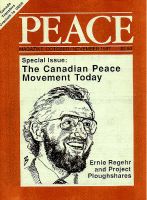
Peace Magazine Oct-Nov 1987, page 29. Some rights reserved.
Search for other articles by PMag staff here
"Nuclear war is the ultimate public health issue." This describes the rationale of the body of 2500 Canadian physicians and health workers who comprise the medical anti-nuclear organization.
Beginning in Toronto in 1980, and calling itself initially Physicians for Social Responsibility like its U.S. counterpart, the organization now has twenty-four chapters across Canada. Most medical schools are sites of chapters and a number of deans of medicine are prominent supporters. Medical students play an active role. The Canadian body is an affiliate of International Physicians for the Prevention of Nuclear war. At this level the organization includes a body of Soviet physicians, as well as European, Asian, African and Australasian affiliates.
Physicians, focussing particularly on the human biological, psychological and social effects of a nuclear catastrophe, aim for the total abolition of nuclear weapons, rather than accepting nuclear deterrence at lower levels of armaments. They therefore support strategies that would move in this direction such as stopping cruise missile testing. The Comprehensive Test Ban proposal has received especially active support, with many physicians using their prescription pads to write "prescriptions" to President Reagan and Prime Minister Mulroney to "Stop all nuclear explosions."
Many physicians feel strongly about the appalling comparison between world expenditure on the means of killing fellow humans and the grossly underfunded health needs of many countries. This issue is featured more prominently in their presentations and literature in recent years.
The need to change the climate of East-West interaction from competition to cooperation is the predominant focus of the international body and has generated several Canadian -- Soviet visits by groups of physicians.
Public education on the human realities of a nuclear catastrophe and the inadequacy of any medical response has been an important theme in CPPNW's activities. Hundreds of presentations have been given in church basements, schools and stadiums, dozens of newspaper articles have been published, thousands of pamphlets distributed, many conferences have been held and several books published.
Education of physician colleagues and of medical students has been another mode of activity. Medical "rounds" at many hospitals and the Canadian medical literature have carried this material to Canada's physician population.
The organization is likely to seek to increase the prominence of debate on the nuclear issue in Canadian democratic participation. "True North Strong and Free?" was an inquiry into Canada's defence sponsored in 1986 by the Edmonton chapter with the help of other organizations. All- party candidates' meetings on Canada's defence and nuclear posture began in a new by-election.
CPPNW faces its greatest challenge in June 1988 when thousands of physicians from all continents will converge on Montréal for the IPPNW Annual Conference. Canadian physicians will subsidize a number of Third World physician delegates to this conference, as the extension of anti-nuclear concerns beyond First and Second World nations is seen as important. The conference will focus on the relationship between the current arms race and global health. Research in the form of a large survey of Canadian children involved the cooperation of physicians and others in twenty communities. Initial data has been widely presented, and more detailed analysis is proceeding.
The perceived importance of establishing collegial relationships with Soviet physicians is clearly a delicate issue for an organization with a fairly conservative base. Concern about the involvement of Soviet physicians in abuse of human rights has been a difficult area, as has the organization's insistence on confining itself to the nuclear issue alone when a dissident Soviet peace activist physician was imprisoned. The resolution of debates on these issues has been that the nuclear threat is the highest priority human ailment and that the organization will devote itself solely to that one.
It has been suggested that the public has been saturated with information on the biological effects of nuclear war and the physicians may have fulfilled their role. Within the organization however, there is no impression of waning enthusiasm or creativity. The new emphasis on global health is likely to absorb the organization's energy for a long time to come.
CPPNW NATIONAL OFFICE, 170-A Poole St., Ottawa, Ontario. K1L7J4 Ph. 6131 233-1982

Peace Magazine Oct-Nov 1987, page 29. Some rights reserved.
Search for other articles by PMag staff here